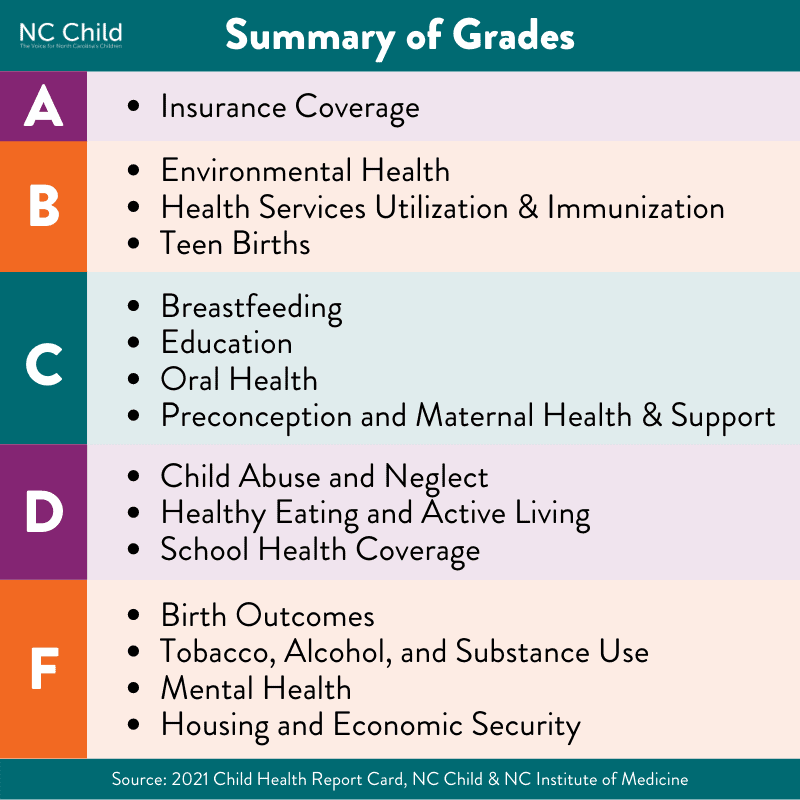The COVID-19 pandemic has turned life upside-down for many families across North Carolina. As families struggle to find their footing, significant barriers continue to keep children from being healthy and reaching their full potential. These challenges impact Black, Indigenous, and Latinx children and those from low-income homes the most. North Carolina’s latest Child Health Report Card illustrates the troubling trends in children’s health using pre-pandemic data, as well as recent Census Bureau data that provide a snapshot of current challenges facing kids and families.
View the 2021 Child Health Report Card.
Published by NC Child and the NC Institute of Medicine, the report card gives the state high marks for children’s health coverage. Unfortunately, communities who have been hit hardest by the pandemic’s economic crisis are also most likely to struggle finding care. Health care coverage is critical for ensuring that children receive preventive care such as immunizations, well-child visits, and dental cleanings.
The report card shows the state is failing children in several key areas, including Mental Health, Substance Use, Birth Outcomes, and Housing & Economic Security. North Carolina received an “F” score for housing and family economic security — two indicators that have worsened for many families over the last year. Even before COVID-19, almost half of North Carolina’s kids lived in poor or low-income households (defined as earning less than 200% of the federal poverty level). In 2019, 26% of children lived in households spending more than 30% of income on housing costs.
Below is a summary of grades in this year’s report:

Opportunities to Strengthen Children’s Health
During the 2021 legislative session, leaders have some important opportunities to address children’s health challenges:
- Strengthening health coverage as a crucial part of North Carolina’s public health response to COVID-19. Expanding access to affordable health coverage – for adults and children alike – is important to children’s physical, mental, and emotional health. When parents are health insurance, they are better able to stay healthy and care for their children. Likewise, their children are also more likely to be insured and to go to the doctor regularly. Hundreds of thousands of North Carolina caregivers lost the health insurance they used to receive through their jobs because of the pandemic. Without insurance, it can be nearly impossible for parents and caregivers to stay healthy. Affordable health coverage has also been proven to be an important bulwark against economic hardship for families.
- Removing barriers to health and health care for NC’s most vulnerable families. We can make sure that thousands of families get the high-quality care they need if we understand what gets in the way. Some of the biggest challenges that families navigate include not having a car to get to the doctor, a shortage of local health care providers, expensive services, and having few providers who understand their language and/or culture.
- Preventing long-term harm to kids by investing in the programs that are proven to insulate families against the harmful effects of poverty. Programs such as Medicaid, SNAP, WIC, and high-quality early childhood education are proven to boost school success and help keep kids healthy throughout their lives.
- Expanding access to broadband internet. State legislators have an opportunity to get broadband internet to about 200,000 homes with students in North Carolina that still have no internet access at home. Currently, these families don’t have the affordable broadband access they need for their kids to attend class remotely. That also limits the family’s ability to get telehealth services, apply for jobs, or apply for vital benefits like Medicaid or SNAP.
Children have the best chance of thriving and living full lives when they have access to physical and mental health care, education, nutritious food, safe housing, and high-quality child care. Our state legislators have a responsibility to make wise policy choices that support children and families at all times – and especially in times of crisis.


